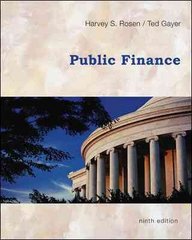Rich lives two periods. His earnings in the present are 100; in the future they are 75.6.
Question:
Rich lives two periods. His earnings in the present are 100; in the future they are 75.6. The interest rate is 8 percent.
a. Suppose that Rich’s earnings are subject to a 25 percent tax. Suppose also that interest earnings are taxed at the same rate and interest paid is tax deductible. Using our life-cycle model, show that this tax generates an excess burden. (Hint: How does the tax change the intertemporal budget constraint?)
b. Suppose now that interest payments are not tax deductible. Does this tax generate an excess burden if Rich is a borrower?
c. Now assume the tax in part a is scrapped in favor of a consumption tax. What consumption tax rate would yield the same tax revenue?
Does this tax distort the choice between present and future consumption?
d. Now assume the consumption tax in part c is instituted, but the deduction of interest payments remains. Does this tax distort the choice between present and future consumption?
Step by Step Answer:






